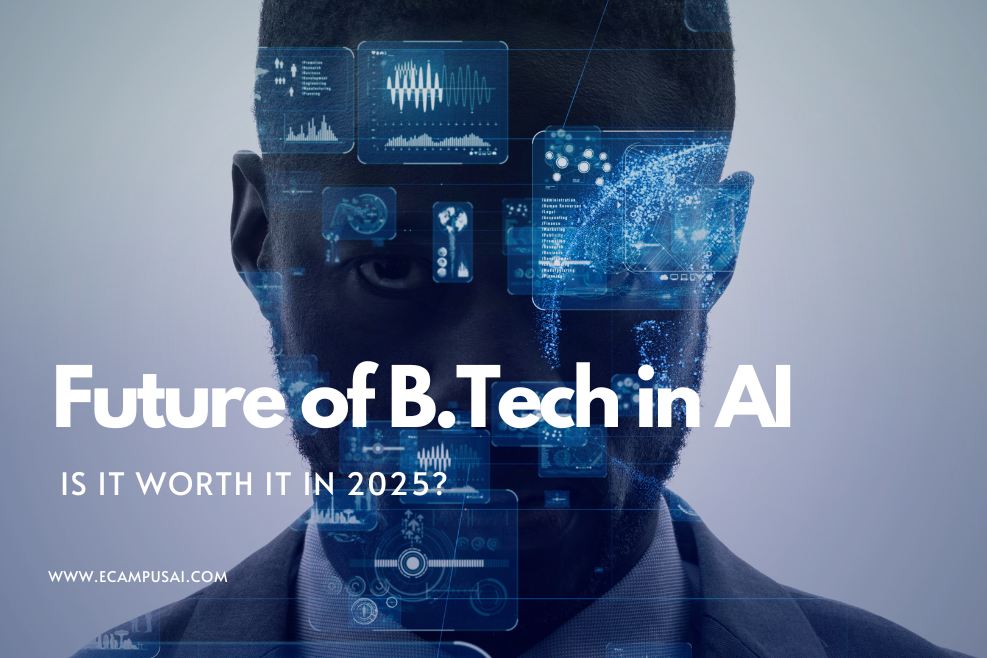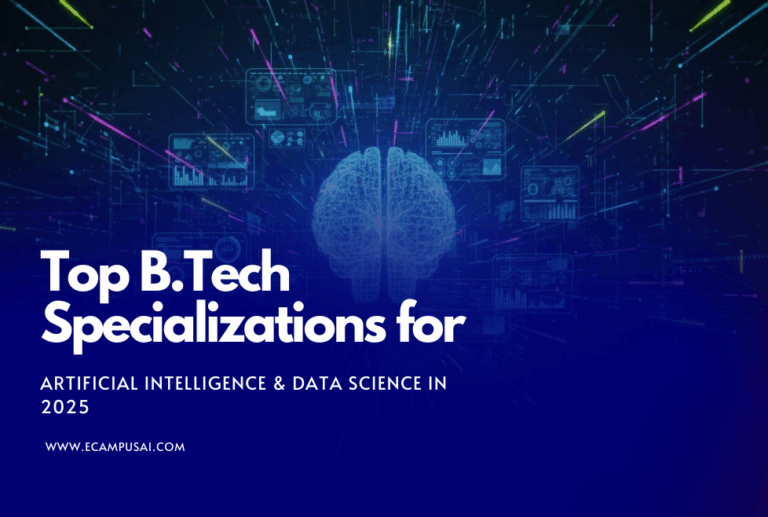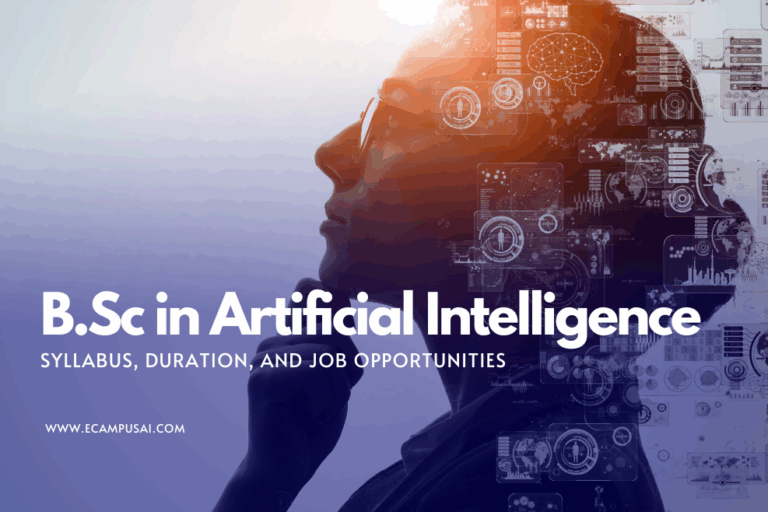Future of B.Tech in AI – Is It Worth It in 2025?
Walk into any tech seminar today, and you’ll hear one word being repeated over and over again—Artificial Intelligence. From chatbots answering customer queries at midnight to cars driving themselves on highways, AI has slipped into our everyday life almost silently. Now, the buzz has reached colleges too, where a B.Tech in AI is being marketed as the degree of the future.
But here’s the big question—is it really worth doing this course in 2025? Let’s talk about it in simple terms.
Why AI Feels Like the “Next Big Thing”
Think about it: five years ago, hardly anyone thought an app could write emails or design graphics on its own. Yet today, tools powered by AI are doing exactly that. Companies, whether small startups or tech giants like Google, are running behind AI talent because they don’t want to miss the wave.
Even the industry report predicts that by 2030, the global computer intelligence market will reach $1 trillion. This isn’t just a number; it’s a hint as to how massive the present prairie will travel toward. Thus, students naturally wonder whether a technological grade focused on AI can secure their future.
The Scope of AI in 2025
If you get a B.Tech. In AI in 2025, you are moving into a career path that is simply traveling in order to expand. Here’s another place where automated reasoning professionals are already making a name.
- AI-based imagination tools in healthcare services help healthcare professionals detect diseases faster. Robotic surgery is no longer sci-fi; it’s happening now.
- Finance: Ever curious about how your banking app automatically detects suspicious transactions? That’s AI.
- Education: Adaptive learning websites suggest study content based on each learner.
- Autos: Tesla and even Indian automakers are hurtling toward autonomous cars.
- Retail: The reason Amazon knows exactly what you want to buy? Yep, AI algorithms.
And these are just a few examples. By the time you graduate, even more industries will join the list.
Careers You Can Aim For
Now, the best part about choosing this degree is the variety of career options it unlocks. Some roles that AI graduates usually land include:
- AI Engineer – Building intelligent systems for real-world use.
- Machine Learning Engineer – Creating models that can “learn” from data.
- Data Scientist – Turning messy data into meaningful insights.
- Robotics Engineer – Designing smart robots that can work in factories, hospitals, or even space.
- Business Intelligence Analyst – Helping companies make smarter decisions using AI-driven data.
It is not bad either under the conditions of wages. Freshers in India get about 6–10 LPA, while experienced AI professionals easily reach 20 LPA. Globally, wages are even higher, often reaching six figures in dollars.
Will AI Still Be Relevant by the Time You Graduate?
It’s reasonable to ask—what if AI is simply hype that will dissipate? In all honesty, AI is merely scratching the surface at present. With Generative AI, self-driving cars, and sophisticated robots becoming ubiquitous, businesses will be pursuing individuals who understand how to make these technologies effective.
Governments are also pouring money into AI research. For example, India’s “AI for All” plan trains young folk for this task. That’s a big hint this work spot won’t just pass by—it’s here to stay.
What You’ll Actually Learn
A B.Tech in AI isn’t just about memorizing definitions. You’ll spend a good amount of time coding, running experiments, and trying out projects. Subjects usually cover things like:
- Python, R, and Java programming
- Machine Learning and Deep Learning
- Natural Language Processing (think chatbots and language translators)
- Computer Vision (how machines “see” objects
- Big Data Analytics
- Robotics and automation
- Cloud and AI integration
The good thing? These skills don’t tie you to one job. You can shift to software work, data checks, or even IT consulting.
The Not-So-Glamorous Side
Of course, let’s be real—this course isn’t for everyone. Some challenges you’ll face are
- Intense Competition: More students are rushing into AI every year.
- Constant Learning Curve: New tools come up so quickly that you’ll need to keep updating yourself.
- Strong Math Requirement: Statistics, probability, and linear algebra will become your daily companions.
- Need for Projects: You need to attract more attention from employers on the subject of what you have built compared to trademarks in your field.
But if you are someone who likes to solve puzzles, code, or try out new technology, these tasks may be stimulating instead of fatiguing.
Opportunities in India and Abroad
In India, big job givers like Infosys, TCS, Wipro, Accenture, & Amazon now hire AI grads. Startups in FinTech, EdTech & HealthTech make new jobs not seen five years back.
If you want to work out, the US, Canada, the UK, & Germany are top spots for AI pros. Also, work from home has mixed borders—lots of Indian pros team up with world groups & stay in their own town.
Is the Investment Worth It?
Colleges normally charge between 2.5 and 10 million a year for a B.Tech. in Computer Science. It might seem expensive from a superficial point of view. Despite this, it turns away from being a smart bet when compared to wage and career growth.
Think of it this way: in the future, companies won’t just need coders. They’ll need people who can build intelligent systems that think and adapt. That’s exactly what this degree teaches you.
Tips to Get Ahead in AI
Here’s a quick checklist if you’re planning to pursue this path:
- Get comfortable with coding—Python should be your best friend.
- Start small projects and upload them on GitHub. Employers love practical proof.
- Do not miss out on internships—they help a lot.
- Keep up by reading AI study books or joining online groups.
- Join in at hackathons; they’re fun & make your resume strong.
Final Words
So, is a B.Tech in Artificial Intelligence worth it in 2025? If you’re serious about tech and innovation, the answer is a loud yes. AI isn’t just another trend—it’s the backbone of future industries.
This degree will not deliver success to your plate, but it will set you on the right path. If you’re prepared to put in the work—coding, testing, and continually learning—you’ll not only have fantastic career prospects but also be among those who help shape the future.
Also Read: Job Opportunities After Graduation in Artificial Intelligence
Frequently Asked Questions
1. What is the future of B.Tech in Artificial Intelligence in 2025?
The future is bright. AI is in demand across IT, healthcare, finance, education, and automation, ensuring strong career opportunities.
2. Is B.Tech in AI worth pursuing?
Yes. It offers high-paying jobs, career growth, and global opportunities as industries increasingly rely on AI-driven technologies.
3. Which careers can I pursue after B.Tech in AI?
You can become an AI Engineer, Machine Learning Specialist, Data Scientist, Robotics Engineer, or AI Research Analyst.
4. What salary can I expect after B.Tech in AI in India?
Fresh graduates usually earn ₹6–10 LPA, while experienced professionals can command salaries above ₹15–20 LPA.
5. Can AI graduates find jobs abroad?
Absolutely. Countries like the USA, UK, Canada, and Germany actively hire AI professionals for research and industry roles.







